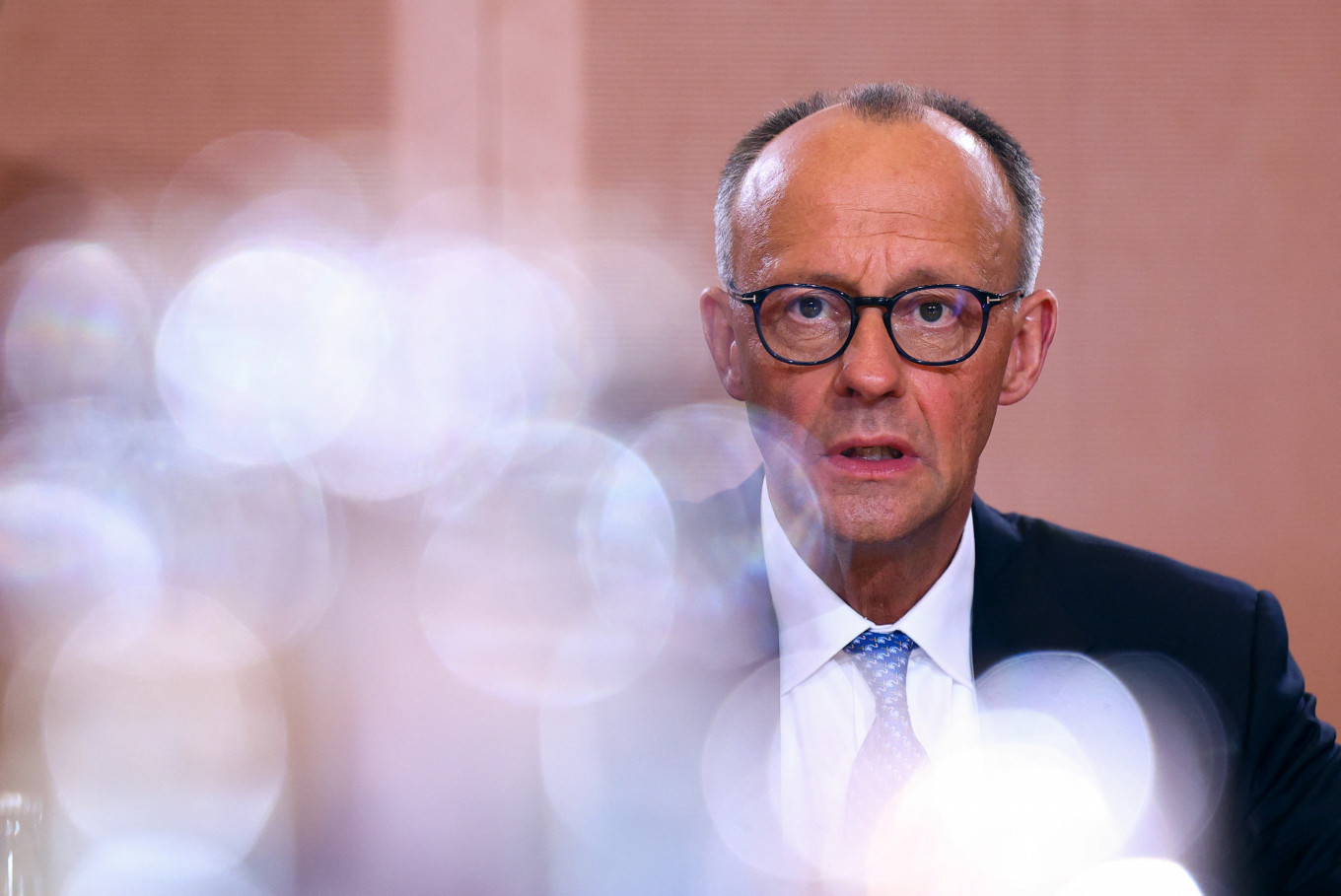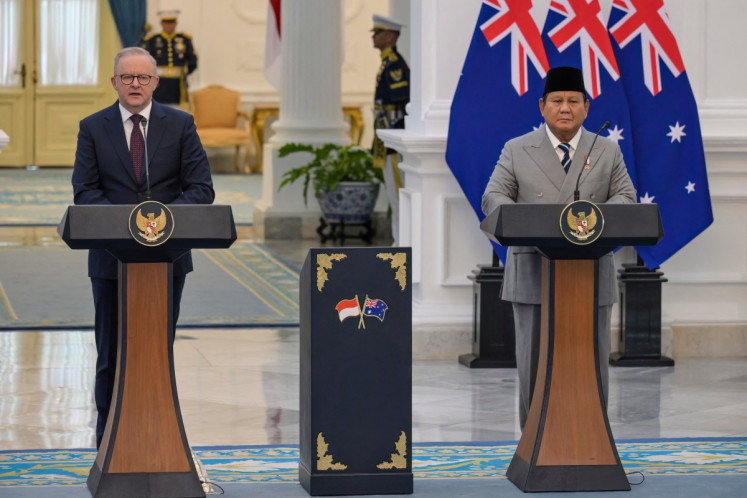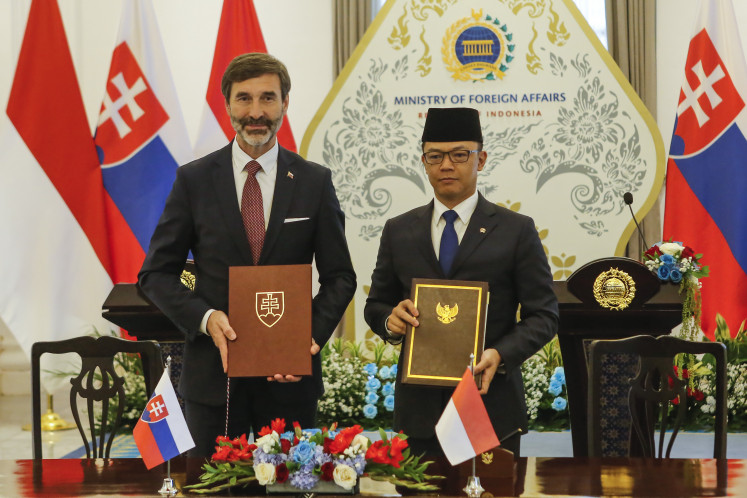Popular Reads
Top Results
Can't find what you're looking for?
View all search resultsPopular Reads
Top Results
Can't find what you're looking for?
View all search resultsConservative Merz elected German chancellor after initial debacle
Change text size
Gift Premium Articles
to Anyone
G
erman conservative leader Friedrich Merz was elected chancellor by parliament on Tuesday in a second round of voting after an unprecedented defeat on the first attempt got his coalition government off to a wobbly start.
Merz, 69, who led his conservatives to a federal election victory in February and signed a coalition deal with the center-left Social Democrats (SPD), won 325 votes, nine more than needed for an absolute majority, in the secret ballot.
He had secured just 310 votes in the first round of voting, meaning at least 18 coalition lawmakers failed to back him.
The debacle will likely heighten mistrust between coalition partners, political analysts said, indicating a far-from-stable union at a time when Europe needs strong leadership from Germany, its largest economy.
"The whole of Europe looked to Berlin today in the hope that Germany would reassert itself as an anchor of stability and a pro-European powerhouse," said Jana Puglierin, head of the Berlin office of the European Council on Foreign Relations think-tank. "That hope has been dashed."
Merz said he preferred to simply get down to work rather than puzzle over the motives of those who failed to back him in the first round.
"I have no doubt, after today, that we will work together in this coalition with mutual trust," he told state broadcaster ARD, adding his top priorities were to secure the country's freedom and restore its economic competitiveness.
Merz takes office as Europe scrambles to agree security guarantees to offer Ukraine as part of any ceasefire deal with Russia and to negotiate a trade accord with the US.
US President Donald Trump this year announced sweeping tariffs that threaten a third year of downturn for Germany, which has already had to grapple with the end of cheap Russian gas since Moscow's full-scale invasion of Ukraine in 2022 and growing rivalry from China.
The German coalition deal has mapped out plans to revive growth such as reducing a corporate tax and lowering energy prices. It also vows strong support for Ukraine and higher military spending.
"We sincerely hope [...] that we’ll see more German leadership in European and transatlantic affairs," Ukrainian President Volodymyr Zelenskiy said on X. "This is especially important with the future of Europe at stake."
After Tuesday's vote, Merz headed to the nearby Bellevue Palace to be formally nominated by President Frank-Walter Steinmeier before returning to the historic Reichstag building to take the oath of office, becoming Germany's 10th chancellor since the end of World War Two.
On Wednesday he makes his first trip as chancellor, to top allies France and Poland, in a bid to show Germany is back on the world stage following November's implosion of the previous SPD-led coalition, the countdown to the February election and then months of horse-trading.
On Thursday he will speak by phone with Trump – and could even meet him before the NATO meeting at the end of June, Merz told the broadcaster ZDF.
Embarrassing start
Merz is known for his abrasive and erratic style, and his failure to win backing for his chancellorship at the first attempt was a first for post-war Germany.
Read also: Merz fails to be elected chancellor in shock first-round vote
Party insiders had said on Monday he would swiftly secure a majority despite grumbling in both coalition parties about cabinet nominations, policy compromises and a huge borrowing package pushed through the old parliament in its final days.
The two coalition parties have lost support since their already dismal performances in February – especially the CDU/CSU conservative bloc, due in part to frustration with Merz's decision to loosen borrowing limits despite campaign promises of fiscal rectitude.
"As the votes are secret, we won't know the official reasons for the failed first round this morning," said Carsten Brzeski, Global Head of Macro at ING Research. "But to us, it looks as though some MPs from the CDU/CSU wanted to show their clear dissatisfaction with Merz's U-turn on fiscal policy following the elections."
The only winner of Tuesday's debacle, according to Forsa pollster Manfred Guellner, was the far-right, anti-establishment Alternative for Germany (AfD), which came second in February and has topped some recent surveys.
"Trust in political institutions is being further damaged," he said.
Merz's designated cabinet reflects a belief in the need for expertise over political capital and a desire for renewal given that diminished trust in the establishment, say analysts. The economy minister and several other cabinet members are new appointees who have private sector experience in their specialized areas.
Only one minister from the previous government will retain his position: Defense Minister Boris Pistorius.
Some in Europe remain optimistic that Merz, a veteran politician who started his career as a European lawmaker in 1989, will be more Europe-minded than his predecessor, Social Democrat Olaf Scholz.
"Congratulations on your investiture, my dear Chancellor Friedrich Merz," wrote French President Emmanuel Macron on X. "It is now up to us to make sure that the Franco-German engine and combined decision-making is stronger than ever.









